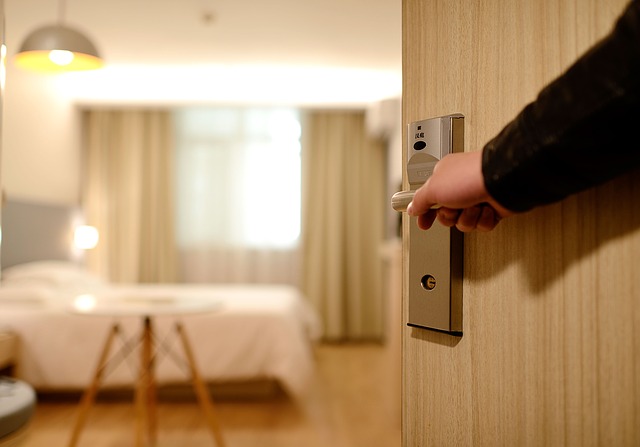
The perceived brand popularity, the booking convenience, and comfort in its rooms might have created a false sense of security for hotels towards their guests. However, this could come at the expense of hotel safety.
Stolen valuables, unauthorized credit card use, and even unauthorized entry are some of the unfortunate consequences hotel guests have experienced simply by failing to apply an extra layer of security when they stay at hotels. Before you become one like them, get to know these security tips whenever you are staying at hotels, motels, or other forms of accommodation.

Table of Contents
Hotel booking
- Check your destination crimes. Get to know the common crimes in your destination, and be aware of neighborhoods to avoid. Who are the common victims, solo travelers? Women?
- Read hotel reviews before booking. Understand the general sentiment of guests in a hotel by checking out reviews across multiple platforms: Yelp and TripAdvisor are among the first ones you should go to. Preference may vary but make location, security, customer service, and facilities among your priorities.
Money matters
- Bring less cash. Do not bring large amounts of cash. Withdrawing them during arrival might yield better rates than dealing with unscrupulous money exchange shops, though this may vary depending on your travel destination.
- Request a specific floor. Room assignment matters so if you can choose the lower floors (second to fourth). The ground floor is too easy to access for non-guests and possible break-ins. (Some hotels require a room key card to access certain floors.) Truck ladders can reach the fourth floor in case of fire.
Travel planning
- Create an itinerary. Create an itinerary (hotel, dates, etc) and share it with family or friends.
- Get a copy of your travel documents. This includes your credit cards, passport (visa page and the front page), hotel booking, and airline tickets. You don’t need all of them but having such copies gives you peace of mind and backup if things don’t go as planned.
Personal information
- Do not disclose your full name. While utterly transparent to staff, your identity should not appear gender-specific to everyone else. This means using an initial for your first name and surname in your hotel booking.
- Label your luggage. Ensure you provide enough information about your luggage so there’s a way to trace you when misplaced or accidentally routed elsewhere. Place info on labels inside and outside your bag but use one with flaps that cover your identity from any passerby.
Checking in hotel
- Ask for hotel information. When you check in, ask for the hotel’s business card with the hotline number and address for the taxi driver’s information, vicinity/city maps, and guidance on police/fire department, fire escape routes, and assembly area during an emergency. Also, place a card near your room phone to make it handy in case of intrusion or emergencies.
- Write down, not say, the room number. Please write the room number for front-line hotel staff instead of saying it aloud. Many non-guests stay in the lobby and maybe just be prospecting for their victims.
- Never place a credit card at the check-in counter. Doing so might expose your card and number to thieves with a powerful camera. Instead, give it directly to hotel staff for verification and processing.

Luggage security
- Lock your luggage. Lock your bags securely, and use TSA-compatible ones so they get opened by authorities easily without smashing them.
- Never lose sight of your luggage. This a piece of common-sense advice, but it needs to be part of a reminder. When you go to the toilet, when talking to hotel staff, when taking your meals at the train station or airport, use a left luggage service if you need to be away from your bags for an extended period.
- Keep important items in a hand-carry bag. Make sure essential items (passport, prescription medicine, laptop, and currency) and items mandated by law such as power banks be kept in your hand-carried luggage.
Inside the hotel room
- Examine your room. Before you unpack inside the hotel, examine the entire room — from door locks to light switches and toilet faucets to safety boxes, ensure everything you need is in good working order. Otherwise, call the front desk and get things sorted out.
- Keep your room number private. There are cases when you need to disclose your hotel number — when you’re dining at the hotel restaurant and wish to pay up during checkout — but other than this, don’t share this information.
- Make a note of your hotel room number. In an emergency that can trigger panicky situations, have your room number easily accessible by remembering it or referring to the jacket of your key card where it’s written.
- Stay safe when using hotel wifi. Hotels often provide free wifi connections to allow you to use it for business or leisure purposes. Ensure you navigate the web via secured locations (access HTTPS-enabled websites), disable file sharing, and log off when done accessing sites.
- Locate the exit pathway. Familiarize your room location, identify the emergency exit, and take a mental note on how to escape your room during an emergency such as a fire or terrorist attack.
- Keep track of your keys. Keys may come in the form of physical keys or security cards. Whatever their form, don’t lose them. If lost, ask for a room replacement.
- Use all the locks on the hotel door. Hotel rooms have multiple locks for a reason. Use them all, especially the double lock. When leaving the room, make sure the front door is locked.
- Check every knock on the door. Do not open the door automatically when you hear a knock especially if you are not expecting someone in. Room service, housekeeping, or any verified hotel employee coming over? Check the peephole or through a locked door.
- Place your valuables in the safety deposit box. Passports, jewelry, or electronic gadgets you don’t need to bring should be stored in the room’s safety box. If none is available, seal and label it in a container, bring it to the front desk safe, and get a claim stub. Leave an impression that the room is occupied by leaving the light on, hanging a “do not disturb” note, or a television playing. This might discourage would-be burglars from even attempting to sneak in.

Going out of the hotel
- Avoid going alone. If possible, avoid the solitary situation. Use valet parking if available; parking your car alone is a security issue. If you’re waiting for a taxi, wait for it to arrive inside the hotel lobby.
- Lock BOTH doors and windows. When you leave the room, don’t just check if the doors get locked. Also, check windows to ensure that burglars or intruders get no chance of getting in.
- Exit using the front door of the hotel. Be sure to know where you’re going (or at least appear confident of where you’ll go) and not appear lost, making you a target for people to attempt to guide you but with bad ulterior motives.
- Deal with suspicious individuals the right way. If you detect someone who might be following you, do not head directly to your hotel room. Instead, slow down and pretend to open your bag and get your water, key, etc. to allow the supposed stalker/attacker to go ahead and confirm he or she is just another hotel guest. Also, you might want to deceive this person — if inside the same elevator — by pressing the floor other than where your room is located. Or head to the lobby and report a possible security threat to security staff.
- Lock items you won’t bring out. If you suspect the room safe is not secure, store your valuables in the hotel safe instead. Some travel insurance policies do not accept liability for items left or lost in the guestroom safes but will include those locked in the hotel safe.
Conclusion
Although there is no way to guarantee your absolute safety when you are in a hotel or in your travel, this checklist should help reduce the chances of hazards or risks. When you plan ahead, you have conditioned your mind and become better prepared to make the right decisions when incidents happen.








